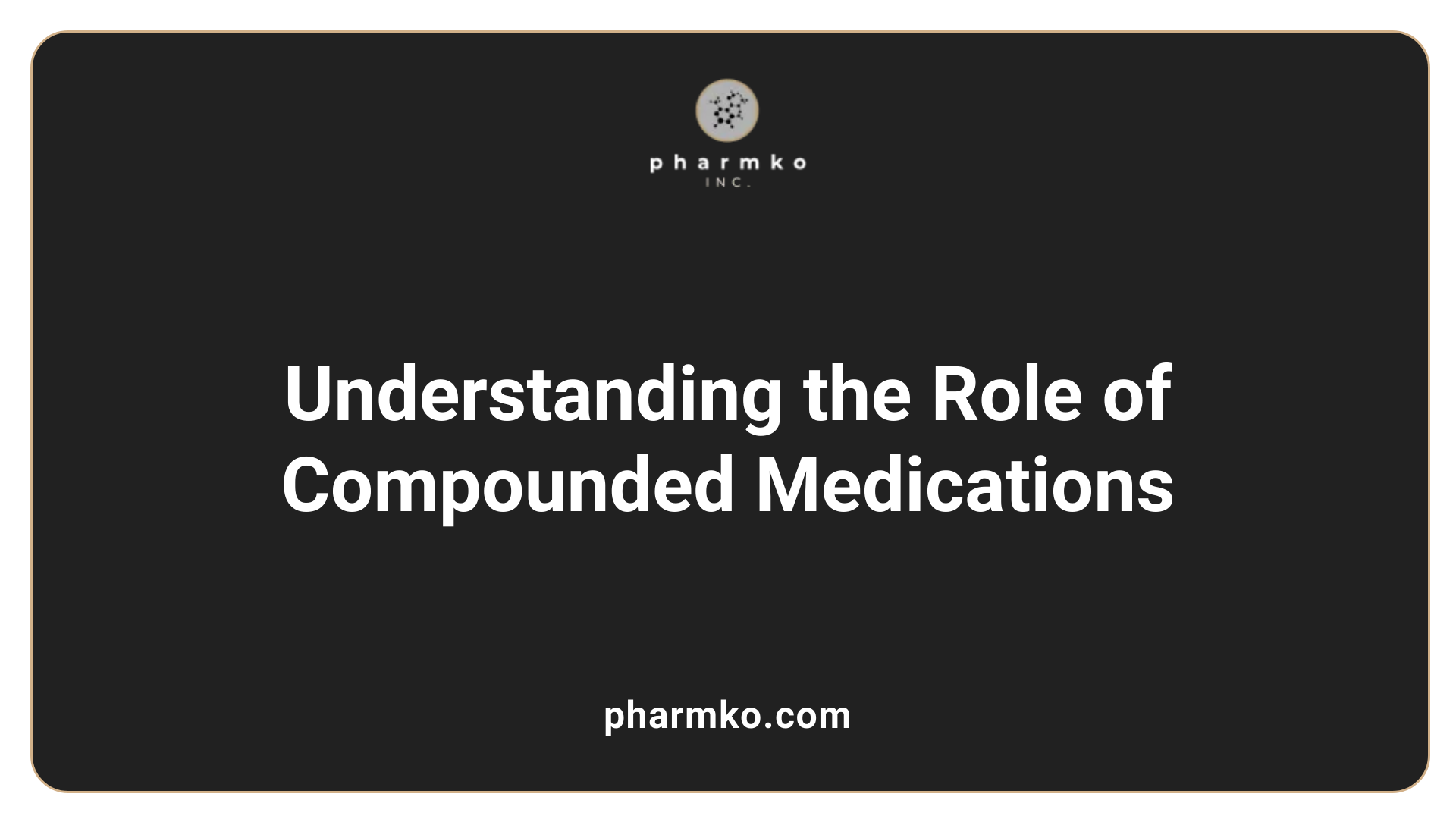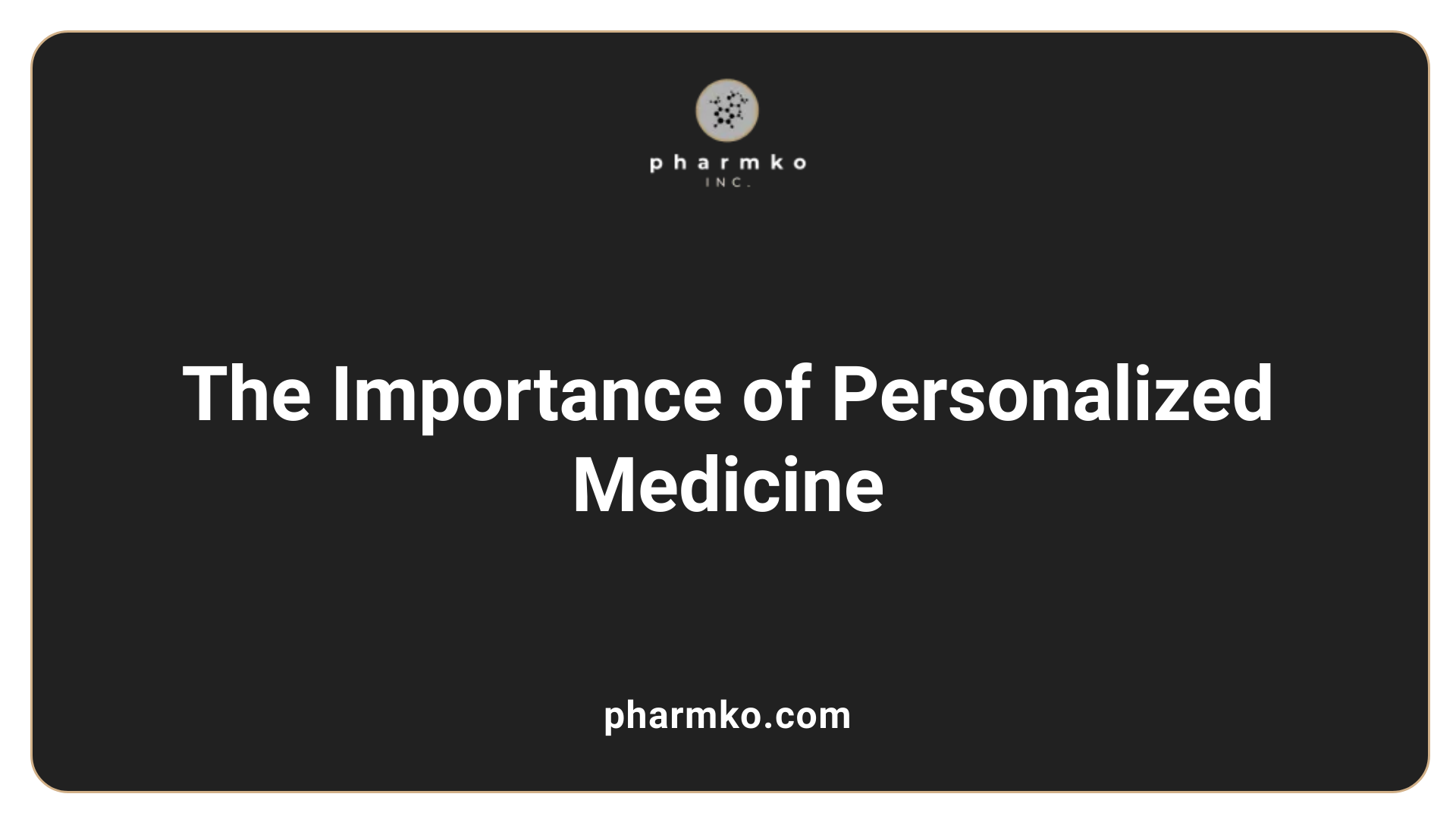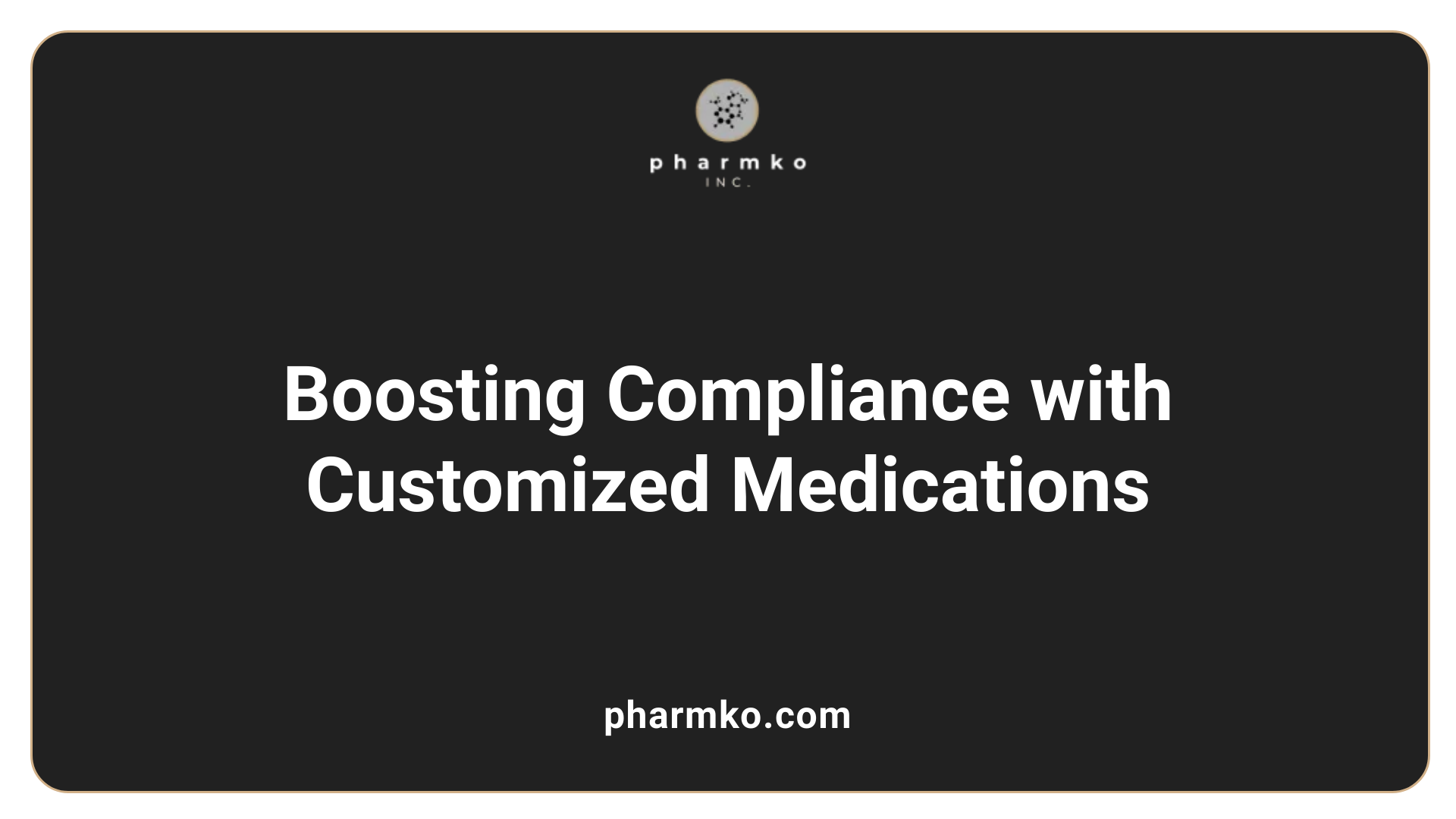How does tailored compounding support patient therapy?
Exploring Tailored Solutions in Patient Care
The healthcare landscape is increasingly shifting towards personalized approaches, where treatments are tailored to meet individual patient needs. At the forefront of this transformation is pharmaceutical compounding, providing customized medication solutions that address specific therapeutic requirements. This narrative delves into how tailored compounding supports patient therapy by enhancing medication adherence, improving treatment outcomes, and embracing technological advancements.
The Necessity and Purpose of Compounded Medications

What are the reasons for compounding in pharmacy?
Compounding in pharmacy is critical for creating individualized medication solutions when commercially available drugs do not meet specific patient needs. This might involve:
- Customizing dosages for specific health requirements, particularly beneficial for children or elderly patients.
- Formulating allergy-free medications to ensure safety for patients with certain ingredient sensitivities.
- Providing alternative forms such as liquids, gels, or creams for those who cannot swallow pills.
- Offering hormone replacement therapies tailored to the exact strengths and combinations required by patients.
- Addressing drug shortages by creating essential medications that adhere to safety standards.
Overall, compounding allows for tailored, effective therapeutic options that enhance patient adherence and outcomes.
What groups of patients may benefit from compounding?
Numerous patient groups can significantly benefit from compounded medications:
- Children who may struggle with swallowing pills, needing palatable liquid formulations.
- Elderly patients facing polypharmacy challenges, benefiting from simplified regimens.
- Individuals with allergies to non-active ingredients, who can receive allergen-free medications.
- Patients during drug shortages where FDA-approved alternatives are unavailable.
While compounding offers solutions, it's important to emphasize that these medications lack the FDA's strict approval process, which can lead to potential safety and quality concerns.
Meeting Individual Patient Needs Through Custom Medications

How do customized medications meet individual patient needs in therapeutic settings?
Customized medications are increasingly recognized for their ability to address specific patient needs in therapeutic contexts. By tailoring drug therapies based on individual genetic, proteomic, and metabolic profiles, healthcare providers can significantly enhance drug efficacy and minimize adverse effects. This level of personalization allows pharmacists to develop formulations that consider genetic variations, environmental factors, and unique health conditions.
Impact on specific conditions
For instance, in treating chronic illnesses or complex conditions like cancer, personalized dosages can ensure that medication is effective for the patient's specific metabolic rate. Additionally, custom medications can facilitate hormone replacement therapy, offering adjustments that align with patients’ unique hormonal needs.
Pharmacogenomics and patient profiles
Furthermore, advancements in pharmacogenomics allow for a more targeted approach to therapy. By analyzing how genes affect a person's response to drugs, healthcare providers can optimize treatment regimens that cater to the patient's profile, ultimately improving adherence and outcomes. This shift towards personalized medicine signals a transformative approach to health care, focusing not on one-size-fits-all solutions, but rather on individualized patient experiences.
The Integral Role of Compounding Pharmacies

What is the role of compounding pharmacies in personalized medicine and patient care?
Compounding pharmacies play a crucial role in personalized medicine and patient care by creating customized medications that meet specific therapeutic needs of individual patients. They address the unique requirements of vulnerable populations, such as pediatric and geriatric patients, by tailoring dosages and formulations, including allergen-free options that enhance adherence. Compounded medications can also simplify complex medication regimens by combining multiple drugs into one dosage form, promoting treatment persistence.
Additionally, the integration of pharmacogenomics allows pharmacists to adjust medications based on a patient's genetic profile, further optimizing treatment outcomes. As the demand for personalized medical care grows, compounding pharmacies continue to be essential in delivering targeted therapies that conventional pharmaceuticals may not provide.
What is the purpose of compounding medications?
The purpose of compounding medications is to create tailored drug formulations that meet the specific needs of individual patients, particularly those who cannot use standard FDA-approved medications due to allergies, specific dosage requirements, or other medical conditions. Compounding allows licensed professionals, such as pharmacists, to combine or alter drug ingredients to formulate a medication that is appropriate for the patient.
However, compounded drugs are not subject to FDA approval, meaning their safety, effectiveness, and quality are not verified before they are dispensed. To address concerns about quality and safety, the FDA has established rules governing compounding practices, especially following issues linked to poor-quality compounded drugs that have led to serious health risks. Ultimately, while compounding serves essential medical needs, it is crucial that patients and healthcare providers remain aware of the associated risks and regulatory frameworks in place.
Enhancing Medication Compliance Through Custom Solutions

How can compounding improve medication compliance?
Compounding can significantly improve medication compliance by consolidating multiple prescriptions into a single customized formulation. This simplification is especially beneficial for patients experiencing polypharmacy, reducing the number of medications they need to track and take.
Pharmacists can tailor medications to address specific needs, such as allergies or difficulty swallowing pills. For example, they can create alternative dosage forms like liquids or gummies, which are generally easier for patients to manage. This customization not only promotes adherence but also lessens the risk of interactions that often stem from complex regimens.
Moreover, compounded medications can minimize side effects that might deter patients from taking their prescribed therapies consistently. By meeting the unique therapeutic needs of each patient, compounding significantly enhances adherence and, ultimately, health outcomes for individuals, particularly older adults with chronic conditions.
Technological Innovations Elevating Compounded Therapies

What are the technological advancements and practices in tailored compounding enhancing patient treatment approaches?
Technological advancements in tailored compounding are significantly enhancing patient treatment approaches in various ways. Innovations like 3D printing enable the creation of customized medications that precisely meet individual patient requirements. This technology allows for the development of unique dosage forms and combinations that are not available commercially, effectively addressing specific therapeutic needs.
Robotic compounding devices also play a pivotal role in enhancing the safety and precision of medication preparation. By reducing human errors during the compounding process, these systems ensure high-quality compounded sterile preparations (CSPs), which is critical for effective patient therapy.
Moreover, compliance with stringent safety standards such as USP General Chapter <797> is maintained through rigorous training and sterilization protocols, bolstering patient safety. The integration of advanced techniques, such as big data analytics, enables a comprehensive understanding of individual patient profiles, allowing pharmacists to tailor medications more effectively.
Future of personalized treatments
Looking ahead, the evolution of proteoformics in drug development stands to revolutionize how we approach personalized medicine. This technology provides invaluable insights into patient-specific biological responses, facilitating the creation of therapies that are not only effective but also minimize adverse effects. As these innovations continue to emerge, they promise a future where compounded therapies are increasingly precise, personalized, and aligned with the unique health profiles of each patient.
The Transformative Impact of Tailored Compounding
Tailored compounding represents a vital component in the contemporary healthcare landscape, bridging gaps where conventional treatments fall short. By custom-fitting medications to precise patient needs, compounding pharmacies substantially contribute to improved therapeutic outcomes and enhanced patient satisfaction. Not only does this approach support individualized care with higher adherence rates, but it also facilitates stronger partnerships between pharmacists, healthcare providers, and patients. With continuous innovation driving safer and more precise solutions, the future of patient therapy is poised to become increasingly personalized, thanks to the enduring value offered by tailored compounding.
References
- Compounding and the FDA: Questions and Answers
- How is therapy volume reduced through sterile compounding?
- The Rising Importance of Compounding Pharmacies ... - Gitlab @ CCI
- An Overview of Compounding - The Clinical Utility of ... - NCBI
- How a compounding pharmacist can help your patients adhere to ...
- So, what is custom compounding anyway? - Nora Apothecary
- Unlocking The Power Of Compounding: How Your Pharmacist Can ...
- The Synergy Between Compounding Pharmacy and Functional ...
- Why Physicians Use Compounded Medications In Their Patient Care
- The Role of Compounding Pharmacies in Personalized Medicine













